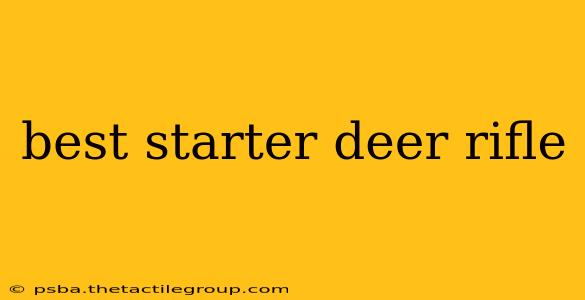Choosing your first deer rifle can feel overwhelming. The market is flooded with options, each boasting unique features and price points. This guide cuts through the noise, offering practical advice to help you select the best starter deer rifle for your needs and budget. We’ll explore caliber choices, action types, and essential features to consider, ensuring a safe and successful hunting experience.
Understanding Your Needs: Before You Choose
Before diving into specific rifle models, consider these crucial factors:
1. Hunting Terrain and Distance:
- Open Fields: If you hunt in open fields where shots might exceed 200 yards, a rifle with a flatter trajectory, like a .270 Winchester or .30-06 Springfield, is preferable. These calibers offer more range and energy downrange.
- Wooded Areas: For denser woods where shots are typically closer (under 100 yards), a shorter-range caliber like a .308 Winchester, 6.5 Creedmoor, or even a smaller caliber like a .243 Winchester, provides excellent accuracy and manageable recoil.
2. Recoil Sensitivity:
Recoil is a significant factor, especially for beginners. Heavier calibers like .30-06 and .300 Winchester Magnum deliver substantial recoil, potentially leading to flinching and inaccurate shots. Lighter calibers like .243 Winchester or 6.5 Creedmoor are considerably more manageable, promoting better shooting habits.
3. Budget:
Deer rifles range from a few hundred dollars to several thousand. Set a realistic budget before you start shopping. Don't compromise on quality, but remember that you can find excellent starter rifles without breaking the bank. Consider used rifles in good condition as a cost-effective alternative.
Top Caliber Choices for Beginners:
Several calibers stand out as excellent choices for first-time deer hunters:
1. .243 Winchester:
- Pros: Relatively low recoil, flat trajectory, good accuracy, widely available ammunition. Excellent for deer-sized game at moderate ranges.
- Cons: Might lack stopping power at longer ranges compared to larger calibers.
2. 6.5 Creedmoor:
- Pros: Excellent balance of accuracy, flat trajectory, manageable recoil, and sufficient stopping power for deer. Increasingly popular choice.
- Cons: Ammunition can be slightly more expensive than .243 Winchester.
3. .308 Winchester:
- Pros: Powerful caliber with good accuracy and stopping power. Widely available ammunition, adaptable to various hunting situations. A classic choice for good reason.
- Cons: More recoil than .243 Winchester or 6.5 Creedmoor.
Action Types: Bolt-Action vs. Semi-Automatic
Most beginner deer rifles fall into these two categories:
Bolt-Action Rifles:
- Pros: Generally more accurate, simpler design, reliable, less expensive than semi-autos. Excellent for learning proper shooting techniques.
- Cons: Slower rate of fire compared to semi-automatic rifles.
Semi-Automatic Rifles:
- Pros: Faster follow-up shots, potentially advantageous in situations requiring quick shots.
- Cons: Often more expensive, more complex mechanics, can be heavier than bolt-actions, and might be less accurate. Generally not recommended for beginners.
Essential Features to Consider:
- Scope: A quality scope is crucial. Choose a scope with sufficient magnification (3-9x or 4-12x) and a good quality lens.
- Stock: A comfortable stock that fits your body type is essential for accurate shooting.
- Safety: A reliable safety mechanism is paramount.
Recommended Rifle Brands for Beginners:
Several reputable brands offer excellent starter deer rifles at reasonable prices. Research specific models within these brands based on your chosen caliber and budget:
- Savage Arms: Known for accuracy and affordability.
- Remington: A long-standing brand with a wide range of models.
- Ruger: Produces durable and reliable rifles.
- Tikka: Offers excellent accuracy at a competitive price point.
Conclusion:
Choosing your first deer rifle requires careful consideration of your hunting style, budget, and physical capabilities. Focus on selecting a caliber with manageable recoil, a comfortable and well-fitting rifle, and a quality scope. Remember, practice is key to becoming a proficient and safe hunter. Seek guidance from experienced hunters and attend a hunter safety course before heading into the field. Good luck, and happy hunting!

